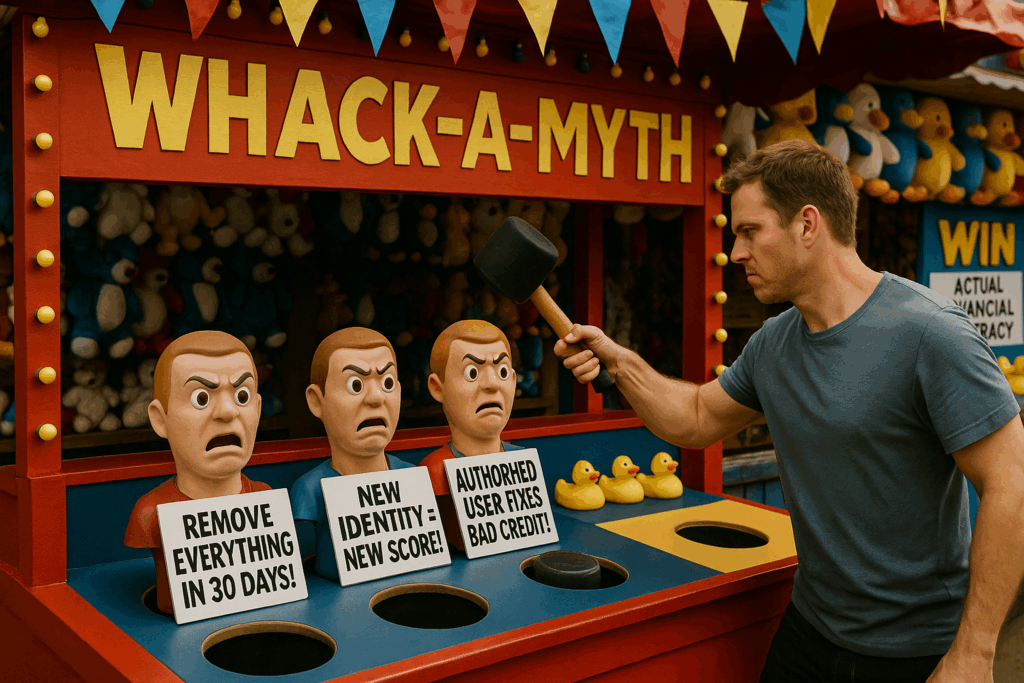3 Credit Repair Myths That Just Won’t Die

If you’ve ever searched “how to fix your credit,” you’ve probably seen it all: fast fixes, shady hacks, and conflicting advice. The credit repair space is full of noise. Unfortunately, a lot of that noise is just flat-out wrong.
Some of these myths have been floating around for years. No matter how many times they get debunked, people still fall for them. So let’s set the record straight.
If you’re looking for a basic breakdown on Credit Repair, check out this blog: Credit Repair 101: What You Need to Know to Get Started.
Here are three credit repair myths that just won’t die, and what you really need to know instead.
Myth #1: You Can’t Remove Anything That’s True
This one sounds reasonable at first. If you really missed a payment or had a collection, it has to stay on your credit report for seven years, right?
Wrong.
Credit reporting laws don’t just care whether something is “true”. They care whether it’s verifiable, accurate, and fairly reported. And those are three very different things.
In other words:
If a creditor can’t prove it, doesn’t follow the proper process, or reports it incorrectly, you have the legal right to challenge it. That’s where real credit repair work happens.
The truth:
You can remove negative items (even if they happened) if they’re reported in a way that violates consumer protection laws. We have more information at How to Dispute Credit Report Information and Correct Errors!
Myth #2: Paying Off Collections Automatically Improves Your Score
You’d think paying off an old debt would help your credit, right? It feels like the responsible thing to do.
But here’s the catch:
Paid collections still stay on your report for up to seven years. And in many cases, they hurt your score just as much as unpaid ones.
That’s not to say you should never pay a collection, but if your goal is to improve your credit, you need a strategy. Sometimes settling a debt with a “pay for delete” agreement (if available) is more effective. Other times, disputing invalid debts is the better move.
The truth:
Paying a collection doesn’t guarantee a score boost. It might even lock a negative item in place longer. Always look at your options before you pay.
Myth #3: Credit Repair Is Illegal or a Scam
This one’s frustrating because it keeps people from getting the help they need.
Let’s be clear:
Credit repair is 100% legal when it’s done the right way.
The Fair Credit Reporting Act (FCRA), the Fair Debt Collection Practices Act (FDCPA), and other laws give you the right to dispute inaccurate, outdated, or unverifiable information on your credit report. Credit repair companies just help you exercise those rights.
Unfortunately, shady companies do exist. They make unrealistic promises, charge upfront fees, or file fake disputes. That’s why credit repair gets a bad name.
The truth:
Credit repair is legal. Scams are not. Do your research, ask questions, and work with people who are transparent about what they do and how they get paid (like us!). If you have any questions about our service, we have a page that goes over everything you might need to know!
Final Thought
Fixing your credit isn’t about loopholes or magic tricks. It’s about knowing your rights, understanding the system, and making smart, legal moves to clean up your report.
At CreditNerds.com, we’ve helped thousands of people challenge errors, remove harmful items, and rebuild their financial future. We don’t charge upfront, and we only get paid when something is successfully removed. That’s not a myth. That’s how it should be. Schedule your free consultation today.

